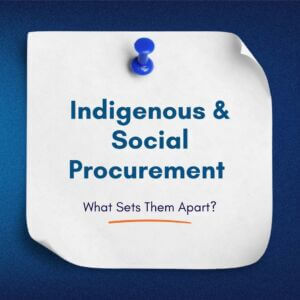By Gabriel Louër

Advancing economic reconciliation in Canada requires implementing both Indigenous and social procurement strategies. As part of the TRC Call to Action 92, many governmental organizations at the provincial and federal level have begun to incorporate these strategies within their organizational structures.
There is, however, a dearth of readily available information regarding Indigenous procurement and social procurement. While both strategies aim to address social inequality through procurement practices, they differ in scope, goals, and targeted outcomes. In this piece, we will help provide you with a brief overview of the key components of the two policy approaches in addition to their differences.
Understanding Indigenous Procurement
Indigenous procurement refers to the practice of specifically prioritizing Indigenous businesses and entrepreneurs in procurement processes. The primary objective of Indigenous procurement is to foster economic opportunities for Indigenous peoples, ensuring they have access to contracts, business development, and employment opportunities.
For instance, at the federal level certain departments have set a 5% target for contracts to be awarded to Indigenous-owned businesses. Moreover, in Manitoba the provincial government has developed a comprehensive framework outlining the “Indigenous Procurement Initiative” that businesses and organizations can adopt.
This practice acknowledges the historical and ongoing economic disparities faced by Indigenous communities and works to address these by supporting their participation in the economy.
Indigenous procurement strategies often include set-aside contracts for businesses owned by Indigenous peoples and communities. It can also involve direct partnerships with Indigenous organizations to co-develop initiatives or projects. The overarching goal is economic reconciliation: creating pathways for Indigenous businesses to thrive, leading to self-sufficiency, wealth generation, and stronger community well-being.
Social Procurement: Broader Impact for Societal Change
Social procurement takes a broader approach, using purchasing power to generate positive social, environmental, and economic outcomes across society. While Indigenous procurement is a subset of social procurement, the latter encompasses a wider range of goals, such as reducing our carbon footprint or limiting single-use plastics.
The aim of social procurement is to leverage the power of procurement to address systemic inequality. This could mean contracting with businesses that promote sustainable practices, provide workforce development for disadvantaged populations, or invest in community programs.
Social procurement helps companies contribute to broader societal goals, such as reducing poverty, promoting diversity, and ensuring environmental sustainability, alongside securing goods or services.
Key Differences and Shared Goals
Both Indigenous procurement and social procurement are vital for achieving greater economic reconciliation and addressing historical injustices. Indigenous procurement directly supports Indigenous communities by creating pathways to economic independence, reducing the wealth gap, and fostering economic self-determination.
At the same time, social procurement encourages businesses to play an active role in addressing social disparities on a larger scale, creating inclusive opportunities that benefit multiple groups across society. This, in turn, often has spill-over effects which generally aligns with the aims of Indigenous procurement policies.
One of the key differences between Indigenous procurement and social procurement, more generally, is the emphasis on hiring and retaining Indigenous workers within the former. According to Statistics Canada, the unemployment rate in 2024 for those from Indigenous communities was 9.8 per cent as compared to the non-Indigenous unemployment rate of 6.2 per cent. This discrepancy has existed for several decades, but only now have Indigenous procurement policies sought to rectify the gap.
Indigenous procurement and social procurement are both crucial to fostering a more inclusive and equitable economy in Canada. By implementing clear policies and building strategic relationships, companies can play an active role in advancing economic reconciliation and social responsibility, creating lasting positive change for all.
Join Our Newsletter
As Manitoba's voice for Indigenous business and your partner in economic reconciliation, we connect you to opportunities that drive change. Subscribe to receive updates on Indigenous business developments, partnership opportunities, and upcoming events delivered straight to your inbox.



